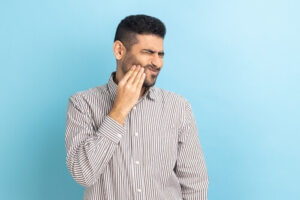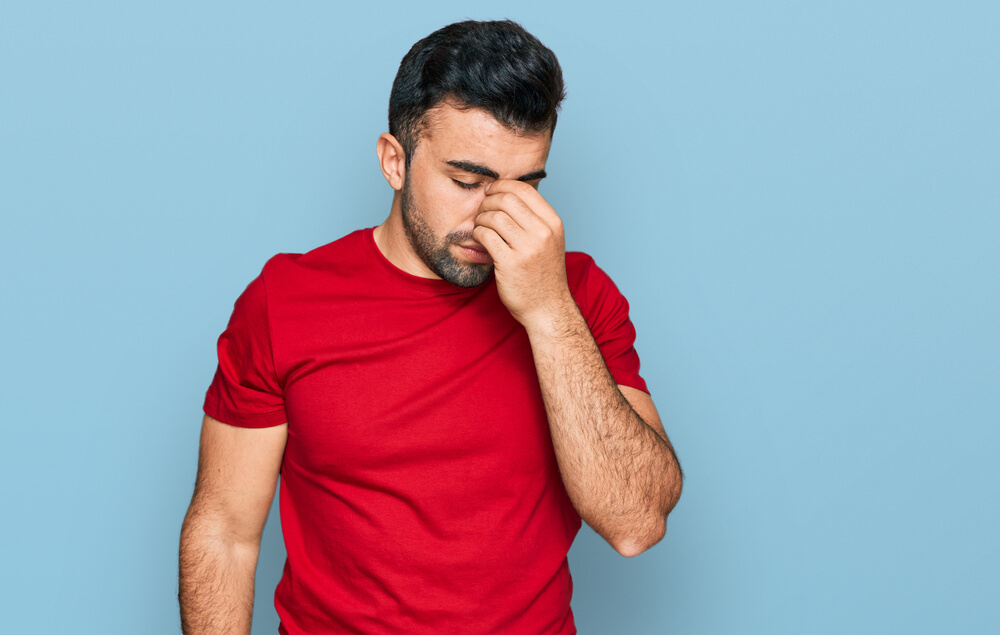Are you grappling with recurring headaches that leave you feeling stressed and worn out? You might be experiencing the common yet often overlooked phenomenon, a clenching headache. This persistent condition can significantly impact your quality of life, causing discomfort and hindering your daily activities.
This article will examine the origins, signs, and available treatments for migraine headaches that cause you to clench your teeth. It will provide insightful information to help you recover control over your health and find relief.
The Connection Between Teeth Clenching and Headaches
Teeth clenching, often occurring unconsciously, especially during sleep, is significantly connected to headaches. Understanding this link is crucial, as it can lead to effective management and relief of these often debilitating symptoms. The mechanics of teeth clenching impact dental health and contribute to the development of various types of headaches, including tension headaches and bruxism headaches.
The Connection Between Teeth Clenching and Headaches:
- Muscle Strain and Tension: Constant teeth clenching leads to overuse of jaw muscles, specifically the masseter and temporalis muscles. This excessive strain can result in sore muscles and fatigue, often radiating as a tension headache.
- Impact on the Temporomandibular Joint (TMJ): Frequent clenching puts pressure on the TMJ, leading to TMJ disorders. Symptoms of these disorders often include jaw pain and headache, typically presenting as a dull, aching pain around the temples.
- Bruxism-Related Headaches: Sleep bruxism, a sleep-related movement disorder, involves involuntary teeth grinding and clenching. It is closely associated with morning headaches, as the intense muscle activity during sleep can cause a throbbing headache upon waking.
- Triggering Migraine Attacks: For individuals prone to migraines, teeth clenching can act as a trigger, leading to severe migraine headaches. The stress and muscle tension from clenching can initiate the onset of a migraine attack.
- Exacerbating Other Headache Disorders: Aside from causing tension and bruxism, teeth clenching can exacerbate other headache disorders. Chronic clenching can contribute to the frequency and intensity of these headaches, leading to a cycle of pain and discomfort.
Identifying Symptoms of Teeth Clenching Headache
Identifying the symptoms of a teeth-clenching headache is crucial for diagnosis and treatment. These headaches, often resulting from bruxism or temporomandibular joint (TMJ) disorders, present distinct characteristics that differentiate them from other headaches. Awareness of these headache symptoms can aid early intervention and prevent further dental and muscular complications.
Identifying Symptoms of Teeth Clenching Headache:
- Morning Headache: A common symptom of teeth clenching is waking up with a headache. These morning headaches often feel like a dull, persistent ache around the temples, which can result from the tension and stress on the jaw muscles due to nighttime clenching or grinding.
- Jaw Pain and Stiffness: Clenching teeth can lead to soreness, pain, or stiffness in the jaw muscles, especially upon waking. This discomfort can extend to the area around the TMJ, leading to difficulty moving the jaw.
- Tooth Sensitivity or Pain: Frequent teeth clenching can result in tooth sensitivity or pain. This is due to the excessive force exerted on the teeth, which can cause wear and tear or even damage the tooth structure.
- Earache or Sinus Pain: The pressure from clenching can radiate pain to the ears and sinuses, often leading to symptoms like earaches or sinus pressure, which can be mistakenly attributed to other causes.
- Muscle Tension in Neck and Shoulders: Teeth-clenching headaches are often accompanied by muscle tension in the neck and shoulders. This tension can be a secondary effect of the strained jaw muscles, leading to a cycle of discomfort extending beyond the head and face.
Common Causes and Triggers of Teeth Clenching

Teeth clenching, a condition often leading to discomfort and headaches, can be triggered by various factors. Understanding these common causes is essential for addressing and managing the condition effectively. Identifying and mitigating these triggers can significantly reduce the frequency and intensity of teeth-clenching episodes.
Common Causes and Triggers of Teeth Clenching:
- Stress and Anxiety: One of the primary triggers for teeth clenching is psychological stress and anxiety. During periods of emotional tension, individuals may subconsciously clench their jaw as a physical manifestation of stress.
- Sleep Disorders: Conditions like obstructive sleep apnea and other sleep disorders can contribute to nocturnal teeth clenching. These disorders often disrupt normal sleep patterns, leading to increased muscle activity in the jaw during sleep.
- Abnormal Bite or Misaligned Teeth: An irregular bite or misaligned teeth can cause uneven pressure on the jaw, prompting teeth clenching as the body attempts to compensate for the imbalance.
- TMJ Disorders: Disorders of the temporomandibular joint can lead to a cycle of pain and muscle tension, which can cause an individual to clench their teeth, consciously or unconsciously.
- Lifestyle Factors: Certain lifestyle choices, such as excessive consumption of caffeine or alcohol, can exacerbate teeth clenching. These substances can increase muscle tension and stress, leading to more frequent clenching episodes.
Effective Treatment Options for Teeth Clenching Headache
Effective treatment for teeth-clenching headaches is vital to alleviate pain and prevent further dental complications. This severe bruxism headache, often a result of bruxism or TMJ disorders, requires a multifaceted approach to address both the symptoms and the underlying causes. Combining dental interventions, lifestyle adjustments, and therapeutic techniques can offer significant relief.
Effective Treatment Options for Teeth Clenching Headache:
- Dental Appliances: One of the primary treatments is using custom-made dental appliances, like mouth guards or splints. These are worn, typically at night, to prevent teeth from clenching and grinding, thereby reducing strain on the jaw muscles and minimizing headaches.
- Physical Therapy: Physical therapy can effectively relieve muscle tension in the jaw and neck. Therapists may use techniques like massage, stretching exercises, and heat therapy to reduce muscle tightness and pain.
- Stress Management Techniques: Using stress-reduction methods like mindfulness, meditation, or yoga might help lessen the frequency and intensity of teeth clenching as stress is a primary trigger for the habit.
- Medication: In some cases, medications such as muscle relaxants or pain relievers may be prescribed temporarily to alleviate discomfort and reduce muscle tension. However, these should be used under the guidance of a healthcare professional.
- Addressing Sleep Disorders: If sleep disorders like sleep apnea contribute to teeth clenching, treating the sleep disorder can reduce clenching incidents. This may involve using CPAP machines for sleep apnea or adopting better sleep hygiene practices.
Preventative Strategies and Lifestyle Changes to Reduce Teeth Clenching

Implementing preventative strategies and making lifestyle changes are key to reducing the occurrence of teeth and jaw clenching, a habit that can lead to chronic headaches and dental issues. By addressing the root causes and modifying daily habits, individuals can significantly diminish the frequency and severity of teeth clenching.
Preventative Strategies and Lifestyle Changes to Reduce Teeth Clenching:
- Stress Reduction: As the main cause of teeth clenching is stress, it can be quite beneficial to practice stress-relieving techniques like yoga, meditation, deep breathing, or physical activity. Regularly practicing these activities helps manage stress levels, reducing the likelihood of clenching.
- Conscious Awareness and Behavior Modification: Being conscious of clenching and actively trying to keep the jaw relaxed can help break the habit. Setting reminders to relax the jaw or practicing mouth exercises can train the muscles to stay more relaxed.
- Improving Sleep Habits: Good sleep hygiene significantly reduces teeth clenching, particularly for those with sleep-related bruxism. More restful sleep may be achieved by creating a relaxing bedtime ritual, making sure the sleep environment is pleasant, and avoiding stimulants like caffeine just before bed.
- Regular Dental Check-Ups: Regular visits to the dentist can help in early detection and management of teeth clenching. Dentists can advise on protective dental appliances or suggest corrective treatments for misaligned teeth, which can contribute to clenching.
- Dietary Considerations: Reducing the intake of hard or chewy foods can alleviate stress on the jaw muscles. Reducing alcohol and caffeine, two drugs that make people more tense, can also be helpful.
In conclusion, teeth clenching can lead to debilitating headaches that significantly impact one’s quality of life. This dental condition, often triggered by stress or anxiety, can cause immense discomfort and hinder daily activities. Treating teeth clenching is crucial in managing and preventing these headaches. By seeking professional help, practicing stress management techniques, and wearing a dental splint, individuals can alleviate these symptoms and improve their overall well-being. Don’t let teeth clenching cause headaches to impact your life – take proactive steps towards finding relief and enjoy a pain-free existence.
References
Teeth Grinding Headaches: Symptoms, Causes, and Treatment
https://www.healthline.com/health/headache/teeth-grinding-headache
Teeth grinding (bruxism) – NHS
https://www.nhs.uk/conditions/teeth-grinding/
Bruxism (teeth grinding) – Symptoms and causes – Mayo Clinic
https://www.mayoclinic.org/diseases-conditions/bruxism/symptoms-causes/syc-20356095
How to Tell if Your Headaches are a Jaw Issue | University of Utah
https://healthcare.utah.edu/the-scope/health-library/all/2018/12/how-tell-if-your-headaches-are-jaw-issue
Headache secondary to sleep-related bruxism: A case with polysomnographic findings – PMC
https://www.ncbi.nlm.nih.gov/pmc/articles/PMC4387823/
